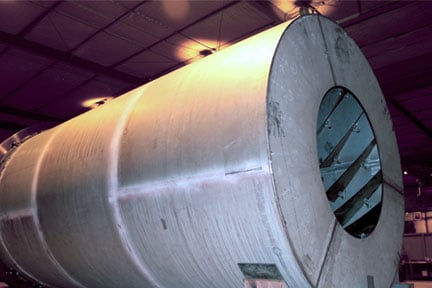Whether working with a dryer, granulator, kiln, or otherwise, an annual rotary drum inspection is the best way to uphold process efficiency, prolong equipment life, and avoid costly downtime and maintenance.
These inspections allow plant managers to catch potential problems early and prevent them from escalating into something more serious. And while it may be tempting to forego periodic inspections in the name of production, these inspections can mean the difference between continued, reliable processing, and costly production losses and maintenance costs.
Why Annual Rotary Drum Inspections Shouldn’t Be Overlooked
While the rotary drum operator should routinely inspect the drum, paying careful attention to any noises, visual abnormalities, or processing inefficiencies, it is still important for a trained service technician to regularly inspect the drum.
Service technicians are highly trained in how rotary drums operate, and what to look for when it comes to the start of potential problems.
When it comes to operations that are processing materials with a high silica content, or materials that are generally abrasive or corrosive, periodic inspections are even more critical, and should be conducted more frequently. These types of materials can cause wear on equipment more quickly, and problems that start out small have a high potential to rapidly escalate into major damage. This is particularly true when it comes to shell thickness and the drum internals, which are most vulnerable to abrasive or corrosive materials.
“A lot of the issues we see on a regular basis could easily have been caught and prevented with a simple annual inspection, says Chad Wiza, FEECO Customer Service Engineer. “Instead, the customer ends up having to rush service technicians out to get them up and running, and unfortunately, it’s not usually an easy fix.”
What an Annual rotary drum Inspection Looks Like
Once you schedule an annual inspection, a FEECO Service Technician will arrive on site. The best time to carry out the inspection is when the drum can be observed in operation, under load, as well as while shut down, in order to inspect drum internals and drive components.
The service technician will do a walk through, observing the drum in operation, and carefully inspecting a variety of components, including:
- Drum shell
- Drum drive
- Trunnion bases
- Inlet breeching/feed chute
- Discharge breeching/discharge chute
- Drum internals
- Burner
- Combustion chamber
- Support structure/piers
- Drum seals
It is a good idea for any associated maintenance personnel and operators to assist in the walk through, in order for the service technician to get feedback from the people who are most familiar with the unit.
After inspecting the drum and all ancillary components, the service technician will provide a detailed report with the inspection findings, including action items – any items that need immediate attention, as well as things to keep an eye on.
This report provides an overall picture of drum health, and any components that are in need of repair, or will soon need attention. The report also provides a record of the condition of the drum so that any reoccurring issues can be more closely investigated. In addition, the report can provide insight to those who may not be as familiar with the drum, such as supervisors or managers, and provides them a better idea of what needs to happen to reduce downtime of the equipment in the future.
Learn how to prepare for a rotary drum service visit >>
Just like any other high-performing machine, rotary drums need regular monitoring to continue running efficiently and an annual inspection is the best way to prevent costly downtime in your industrial process. While it may be tempting to overlook them, annual inspections can save thousands in production losses and maintenance costs.
FEECO’s Customer Service Team is highly skilled in rotary drum inspections and can inspect and service any brand of equipment, anywhere around the globe. Our Customer Service Engineers are with you through the long haul- preventative monitoring, maintenance, and spare parts. The FEECO service team always has you covered.
To schedule your annual rotary drum inspection, contact us today!

